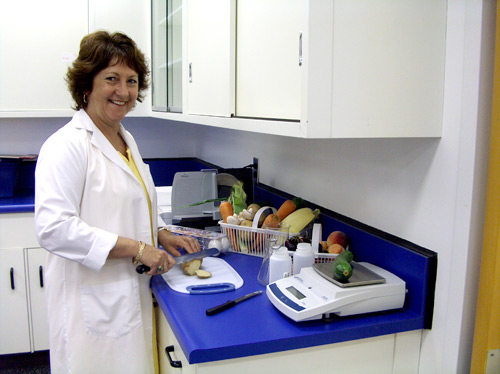
Liz Forbes is a critical link in Canada’s food-safety information chain. The senior college lecturer at the University of Guelph ─ Kemptville Campus is helping identify and monitor contaminated foods so that government officials can take appropriate action.
Forbes is involved in Health Canada’s Total Diet Study, which has been conducted across Canada since 1969. Its main purpose is to determine how many and what contaminants the average Canadian — from infants to seniors — consumes in their diet. It also aims to ensure that any contaminants present remain at levels low enough to mitigate health risks.
For example, if a certain age group is found to be consuming potentially dangerous amounts of a certain contaminant — say, higher-than-normal mercury levels in fish — the study can help authorities identify the source of the problem.
“We can follow our food supply and have an idea of what we’re eating,” says Forbes. “If there is a concern, it can be found, traced and followed-up on. It’s about information management right from the get-go.”
As part of the Total Diet Study, Health Canada assembles a list of about 210 food items that were the most-purchased by Canadians over the past year. Forbes reviews the sample preparation techniques for each food item and makes recommendations as required.
She also trains Canadian Food Inspection Agency (CFIA) employees on how to shop to match the buying habits of average Canadians and what specific food items need to be purchased.
CFIA employees then purchase each food item from three or four local grocery stores, cataloguing it by brand, lot number and store. This allows Health Canada to trace the affected food back to where it was originally purchased, processed or grown.
Purchased foods are shipped to Forbes at the Kemptville campus. Her staff prepare the food, anything from roast beef to raisin pies, as it would normally be prepared in a household. Composite samples are then bottled, labeled and catalogued before being packed and sent to Health Canada laboratories in Ottawa to be analyzed for contaminants.
Teaching safe food preparation techniques extends into other areas of Forbes’ professional life. She co-ordinates the food service workers certificate program at Kemptville, which is designed for caregivers preparing food in long-term care facilities. The Health Canada-funded project teaches students about food safety, basic food preparation, diet, nutrition and customer service.
“The idea is to have a safe food supply and keep people informed and educated along the way,” says Forbes.